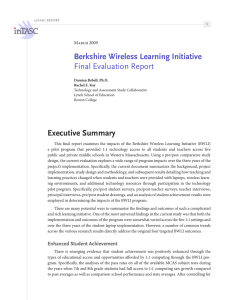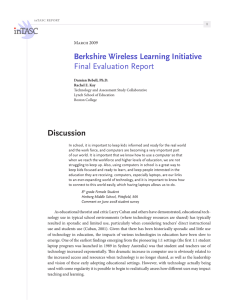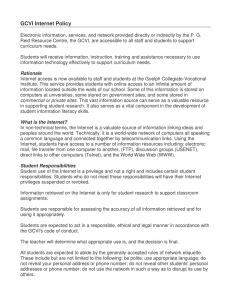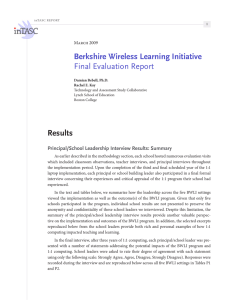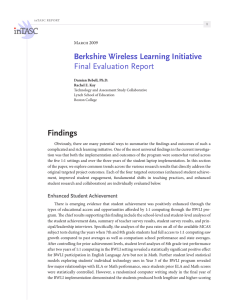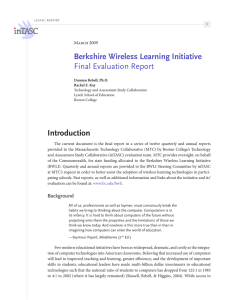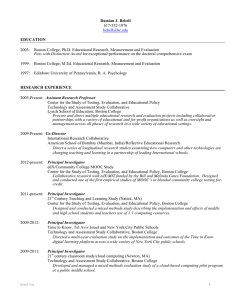References Berkshire Wireless Learning Initiative Final Evaluation Report March 2009
advertisement
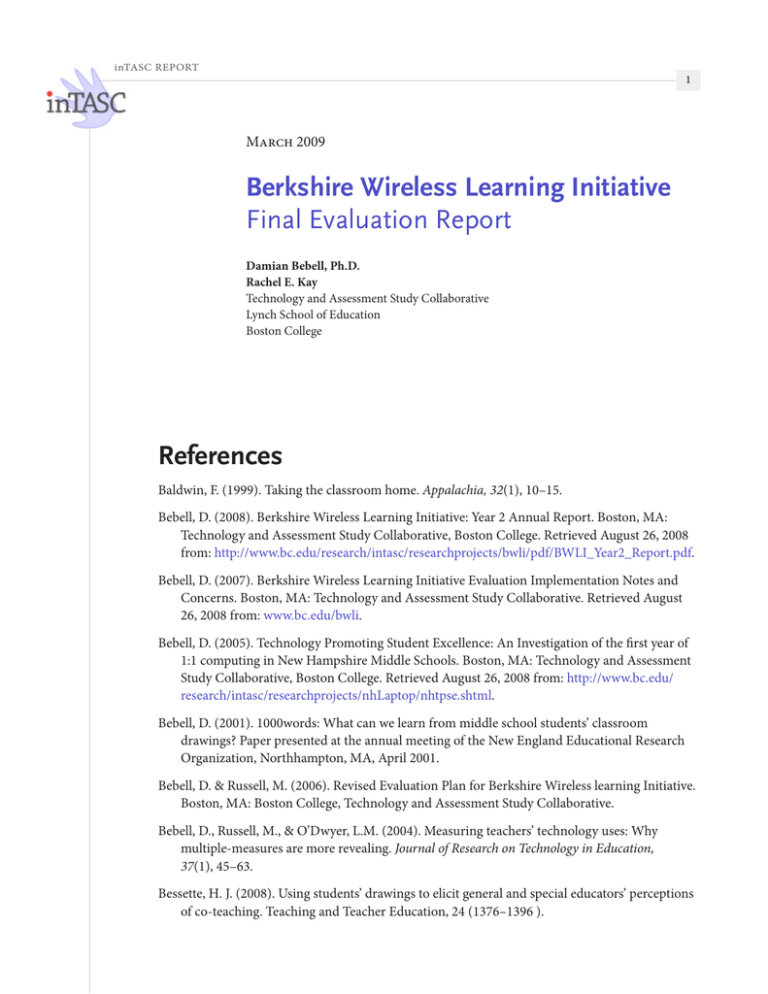
inTASC REPORT 1 March 2009 Berkshire Wireless Learning Initiative Final Evaluation Report Damian Bebell, Ph.D. Rachel E. Kay Technology and Assessment Study Collaborative Lynch School of Education Boston College References Baldwin, F. (1999). Taking the classroom home. Appalachia, 32(1), 10–15. Bebell, D. (2008). Berkshire Wireless Learning Initiative: Year 2 Annual Report. Boston, MA: Technology and Assessment Study Collaborative, Boston College. Retrieved August 26, 2008 from: http://www.bc.edu/research/intasc/researchprojects/bwli/pdf/BWLI_Year2_Report.pdf. Bebell, D. (2007). Berkshire Wireless Learning Initiative Evaluation Implementation Notes and Concerns. Boston, MA: Technology and Assessment Study Collaborative. Retrieved August 26, 2008 from: www.bc.edu/bwli. Bebell, D. (2005). Technology Promoting Student Excellence: An Investigation of the first year of 1:1 computing in New Hampshire Middle Schools. Boston, MA: Technology and Assessment Study Collaborative, Boston College. Retrieved August 26, 2008 from: http://www.bc.edu/ research/intasc/researchprojects/nhLaptop/nhtpse.shtml. Bebell, D. (2001). 1000words: What can we learn from middle school students’ classroom drawings? Paper presented at the annual meeting of the New England Educational Research Organization, Northhampton, MA, April 2001. Bebell, D. & Russell, M. (2006). Revised Evaluation Plan for Berkshire Wireless learning Initiative. Boston, MA: Boston College, Technology and Assessment Study Collaborative. Bebell, D., Russell, M., & O’Dwyer, L.M. (2004). Measuring teachers’ technology uses: Why multiple-measures are more revealing. Journal of Research on Technology in Education, 37(1), 45–63. Bessette, H. J. (2008). Using students’ drawings to elicit general and special educators’ perceptions of co-teaching. Teaching and Teacher Education, 24 (1376–1396 ). inTASC REPORT: BWLI Final Evaluation Report: References, March 2009 Damian Bebell & Rachel Kay 2 Bull, G., Bull, G., Garofolo, J., & Harris, J. (2002). Grand Challenges: Preparing for the Technological Tipping Point. The International Society for Technology in Education (ISTE). Retrieved May 7, 2004, from http://www.iste.org/L&L/29/8/featured-article/bull/index.htm. Cromwell, S. (1999). Laptops change curriculum—and students. Education World. Retrieved November 6, 2003 from http://www.education-world.com/a_curr/curr178.shtml. Cuban, L. (2001). Oversold and Underused: Reforming Schools Through Technology, 1980–2000. Cambridge MA: Harvard University Press. Dunleavy, M. & Heinecke, W.F. (2007). The Impact of 1:1 Laptop Use on Middle School Math and Science Standardized Test Scores. Computers in the Schools, 24(3/4), 7–22. eSchool News. (2006, May 1). 1-to-1 computing on the rise in schools. eSchool News Online. Retrieved June 1, 2006, from http://www.eschoolnews.com/news/showstory. cfm?ArticleID=6278. Glass, G., & Hopkins, K. (1996). Statistical methods in education and psychology (3rd ed.). Boston: Allyn and Bacon. Great Maine Schools Project. (2004). One-to-One Laptops in High School Environment. Piscataquis High School Study Final Report. Retrieved April 25, 2007 from http://www.greatschoolspartnership.org/pdf/One-to-OneComputing_Report.pdf. Guignon, A. (1998). Laptop computers for every student. Education World. Retrieved November 6, 2003, from: http://www.education-world.com/a_curr/curr048.shtml. Gulek, J.C. & Demirtas, H. (2005). Learning with technology: The impact of laptop use on student achievement. Journal of Technology, Learning, and Assessment, 3(2). Hayes, J. (2006). America’s digital schools; 2006: A five-year forecast. Retrieved April 9, 2006 from http://www.ads2006.org/ads2006/pdf/ADS2006KF.pdf. Maine Education Policy Research Institute (MEPRI). (2003). The Maine Learning Technology Initiative: Teacher, Student, and School Perspectives Mid-Year Evaluation Report. Retrieved November 6, 2003 from http://www.usm.maine.edu/cepare/pdf/ts/mlti.pdf. Massachusetts Department of Education. (2008). Ensuring Technical Quality: Policies and Procedures Guiding the Development of the MCAS Tests. Malden, MA: Massachusetts Department of Elementary and Secondary Education. Accessed January 15, 2008 from: www.doe.mass.edu/mcas/2008/release/technical_quality.doc. Luke, D. A. (2004). Multilevel Modeling. Thousand Oaks, CA: Sage Publications. O’Dwyer, L.M., Russell, M., Bebell, D., & Tucker-Seeley, K.R. (2005). Examining the relationship between home and school computer use and students’ English/language arts test scores. Journal of Technology, Learning, and Assessment, 3(3). Retrieved September 27, 2008 from http://www.jtla.org. inTASC REPORT: BWLI Final Evaluation Report: References, March 2009 Damian Bebell & Rachel Kay 3 O’Dwyer, LM., Russell, M., Bebell, D., & Seeley, K. (2008). Examining the Relationship between Students’ Mathematics Test Scores and Computer Use at Home and at School. Journal of Technology, Learning, and Assessment, 6(5). Retrieved September 27, 2008 from http://www.jtla.org. Oppenheimer, T. (2003). The flickering mind: The false promise of technology in the classroom and how learning can be saved. New York, NY: Random House. Papert, S. (1996). The connected family: Building the digital general gap. Atlanta, GA: Long Street Press. Papert, S. (1993). Mindstorms : Children, computers, and powerful ideas. 2nd ed. New York: Basic Books. Papert, S (1992). The children’s machine. New York, NY: Harper Collins. Prensky, M. (2006) Don’t bother me mom, I’m learning! St. Paul, MN: Paragon House Publishers. Ravitz, J., Wong, Y., & Becker, H. (1999). Teacher and teacher directed student use of computers and software. Irvine, CA: Center for Research on Information Technology and Organizations. Rockman, S. (1998). Powerful tools for schooling: Second year study of the laptop program. San Francisco, CA: Author. Russell, M. (1999). Testing Writing on Computers: A Follow-up Study Comparing Performance on Computer and on Paper. Education Policy Analysis Archives, 7(20). Available: http://epaa.asu.edu/epaa/v7n20/. Russell, M., Bebell, D., Cowan, J. & Corbelli, M. (2003). An AlphaSmart for each student: Does teaching and learning change with full access to word processors? Computers and Composition. 20, 51–76. Russell, M., Bebell, D., & Higgins, J. (2004). Laptop Learning: A comparison of teaching and learning in upper elementary equipped with shared carts of laptops and permanent 1:1 laptops. Journal of Educational Computing Research. 30(3), 313–330. Russell, M., Bebell, D., O’Dwyer, L.M., & O’Connor, K.M. (2003) Examining teacher technology use: Implications for pre-service and in-service teacher preparation. Journal of Teacher Education 54(4), pp. 297–310. Russell, M. & Haney, W. (1997). Testing writing on computers: an experiment comparing student performance on tests conducted via computer and via paper-and-pencil. Education Policy Analysis Archives, 5(3). Available: http://epaa.asu.edu/epaa/v5n3.html. Russell, M., O’Brien, E., Bebell, D., & O’Dwyer, L. (2003). Students’ beliefs, access, and use of computers in school and at home. Boston, MA: Boston College, Technology and Assessment Study Collaborative. inTASC REPORT: BWLI Final Evaluation Report: References, March 2009 Damian Bebell & Rachel Kay 4 Russell, M. & Plati, T. (2001). Mode of Administration Effects on MCAS Composition Performance for Grades Eight and Ten. Teachers College Record, [Online]. Available: http://www.tcrecord.org/Content.asp?ContentID=10709. Sandstrom, M. Bartini, M. and Bebell, D. (1998). Gender and Grade Differences in Internet Aggression: Development of the eBehavior Scale. Presented at the March 2008 Annual Meeting of the Society for Research on Adolescence, Chicago IL. Shapley, K. (2008). Evaluation of the Texas Technology Immersion Pilot (eTxTIP): Year 2 Results. Paper presented at the 2008 Annual Meeting of the American Educational Research Association, New York, NY. Silvernail, D. (2008). Maine’s Impact Study of Technology in Mathematics (MISTM). Paper presented at the 2008 Annual Meeting of the American Educational Research Association, New York, NY. Silvernail, D.L. & Lane, D.M. (2004). The impact of Maine’s one-to-one laptop program on middle school teachers and students. Maine Education Policy Research Institute (MEPRI), University of Southern Maine. Weston, M.E. & Bain, A. (2009). Achieving the elusive: Enhancing teaching, learning, and increasing student achievement. One-to-One newsletter, 2(2), 3–4. Zucker, A. and Light, D. (2009). Laptop Programs for Students. Science Vol. 323 No. 82. Downloaded March 1, 2009 from www.sciencemag.org. Zucker, A. and Hug, S. (2008). Teaching and Learning Physics in a 1:1 Laptop School. Journal of Science Education Technology. Vol. 17, No. 6, pp.586–594.
